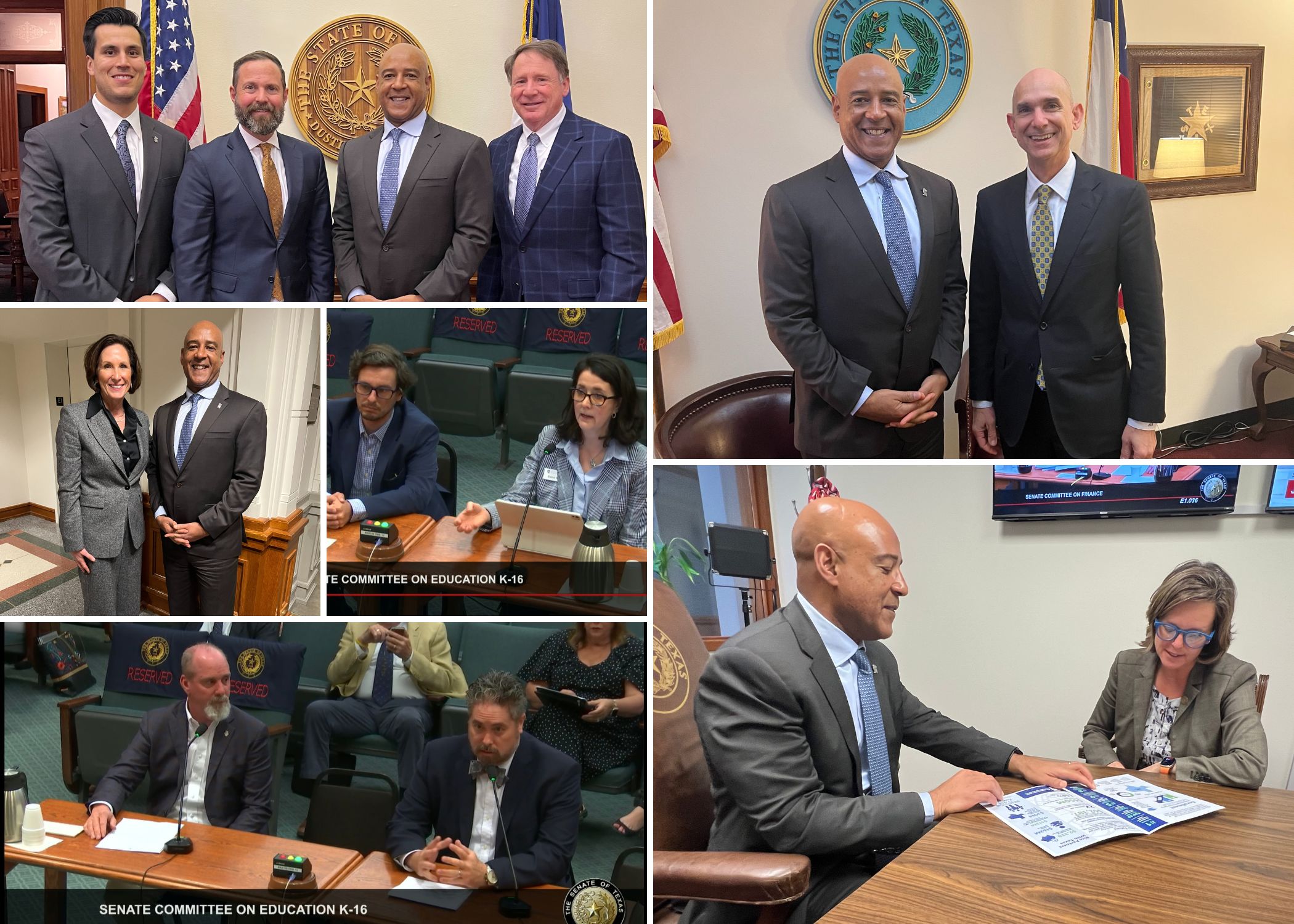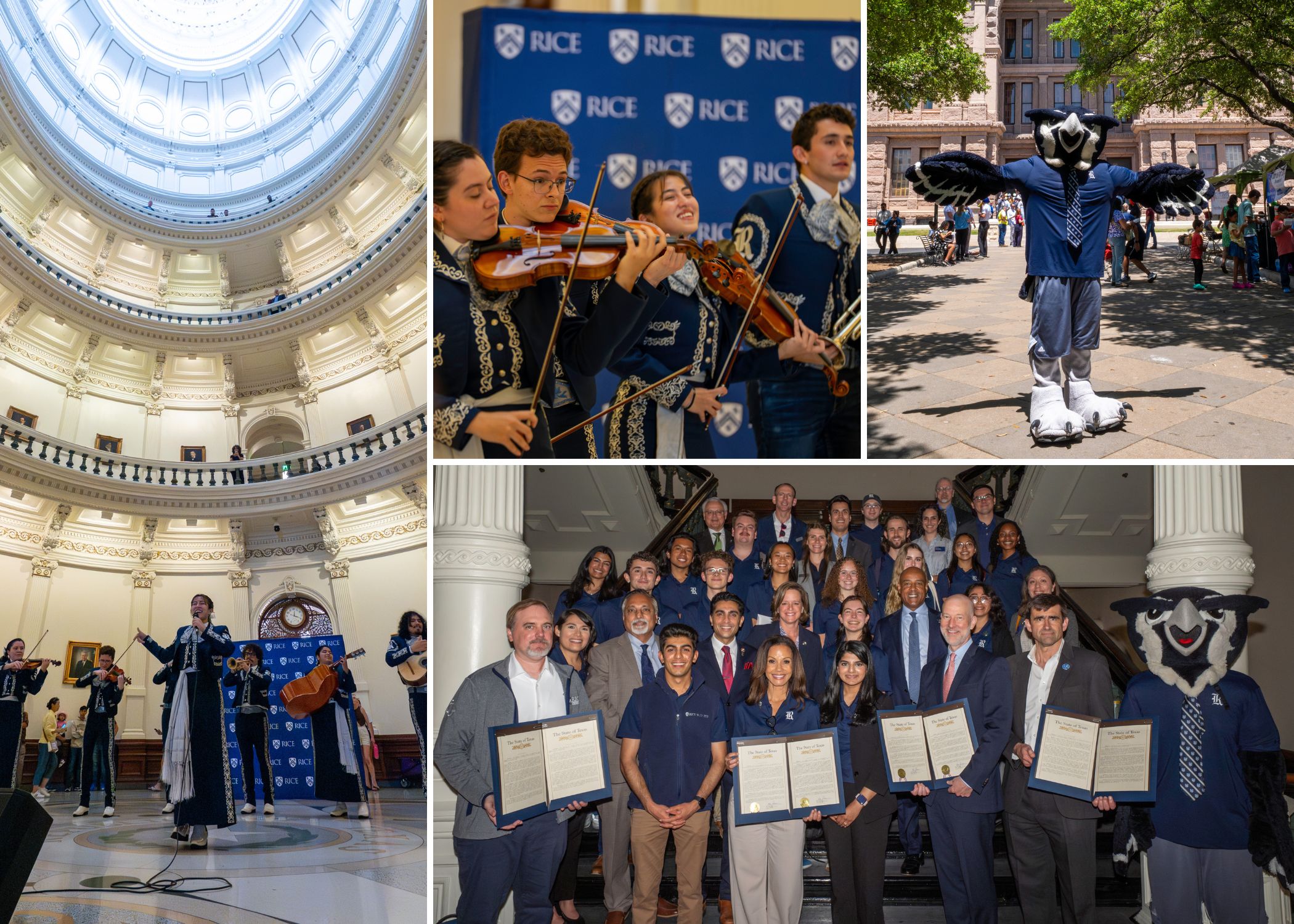
The Texas 89th Legislative Session, which adjourned June 2, marked a milestone for Rice University’s government relations efforts as the university played a vital role in advancing key legislative priorities that support research, student health and higher education opportunities in the state. In addition to making headway on major bills, Rice organized its first-ever Rice Day at the Capitol, a historic gathering that brought students, faculty and leadership face-to-face with state lawmakers.
Rice’s presence in Austin was felt throughout the 140-day session, which saw more than 9,000 bills filed and nearly 1,200 signed into law. Through its collaboration with Cornerstone Government Affairs and strategic advocacy from university leadership — including two visits from President Reginald DesRoches — Rice helped shape outcomes on high-impact legislation that could benefit not only the university but also the broader Texas research and education community.
“This session demonstrated what’s possible when higher education, innovation and advocacy work in lockstep,” said Joel Resendez, director of state government relations. “Our engagement this year laid the groundwork for long-term partnerships that will expand opportunities for Rice and for Texas. It was exciting to see the enthusiasm and momentum behind our priorities.”

Advancing brain health
Rice played a leading role in the passage of Senate Bill 5, which establishes the Dementia Prevention and Research Institute of Texas (DPRIT) — a bold initiative designed to accelerate discoveries in brain health. The institute, funded with an initial $3 billion allocation, will support research on Alzheimer’s, Parkinson’s and related neurodegenerative diseases.
Rice’s involvement included direct engagement with legislative stakeholders and coalition-building alongside fellow universities and medical institutions. Harris Eyre, the Harry Z. Yan and Weiman Gao Senior Fellow in Brain Health at Rice’s Baker Institute for Public Policy, worked closely with the lieutenant governor’s office to define the initiative’s scope. DesRoches advocated for the proposal in meetings with Speaker Dustin Burrows, R-Lubbock, and Rep. Greg Bonnen, R-Friendswood, chairman of the House Appropriations Committee, emphasizing Rice’s commitment to addressing one of the most pressing health challenges of our time. Also, DesRoches will have the opportunity to appoint a member of the DPRIT higher education advisory committee to advise on issues and opportunities involving research on neurodegenerative diseases.
Lowering health care costs for students
Rice also successfully backed Senate Bill 1409, which allows Texas universities to self-fund student health insurance plans — a move expected to increase plan flexibility and reduce costs for both students and institutions. DesRoches helped advance the bill by meeting with its legislative champions, Rep. Ann Johnson, D-Houston, and Sen. Tan Parker, R-Flower Mound, in Austin. Elaine Britt, Rice’s executive director of human resources operations, testified in both Senate and House committees, sharing insights from Rice’s health care planning experience and underscoring the benefits of this change for students.
Laying the foundation for future research investments
Another major priority was Senate Bill 1032, which sought to expand eligibility for the Governor’s University Research Initiative (GURI) to include private institutions like Rice. Michael King, the E.D. Butcher Chair of Bioengineering and a CPRIT Scholar, testified in favor of the bill at the request of Sen. Lois Kolkhorst, R-Brenham, who carried the legislation.
The bill passed both chambers with strong bipartisan support but was ultimately vetoed by Gov. Greg Abbott, who cited the program’s lack of funding this session. Although the veto paused immediate progress, the university remains optimistic about future opportunities should GURI be fully funded in a later session.
Historic first: Rice Day at the Capitol
On April 14, Rice made history by hosting its inaugural Rice Day at the Capitol. More than 50 students, faculty and staff traveled to Austin for a full day of advocacy, education and celebration. The event served as a showcase of the university’s statewide impact in areas ranging from innovation to the arts and sciences.
DesRoches led the Rice delegation in over a dozen meetings with lawmakers and legislative staff, highlighting how the university’s research, public service and education advance Texas’ future. The day also celebrated a special occasion — the 50th anniversaries of four of Rice’s cornerstone schools: the George R. Brown School of Engineering and Computing, Wiess School of Natural Sciences, Jesse H. Jones Graduate School of Business and the Shepherd School of Music. Deans Thomas Killian and Matthew Loden joined the festivities, along with students and faculty who offered a firsthand look at Rice’s dynamic academic community.
Rice Day at the Capitol also strengthened relationships with policymakers and created new pathways for student and faculty engagement in state government. For many participants, it was a firsthand experience of democracy in action — and a powerful reminder of the university’s potential to shape public policy.

Other noteworthy legislative wins
In addition to its core legislative priorities, Rice engaged on several other bills with significant implications for research, education and institutional operations. Here are some of the highlights:
-
Research Security Council established – House Bill 127
-
Creates a statewide council to strengthen research security; Rice secured a provision allowing private tier one institutions to participate, thanks to advocacy by Tam Dao.
-
-
Boosting community college transfers – Senate Bill 1786
-
Ensures transfers from community colleges to Rice count toward community colleges’ state funding formulas, enhancing collaboration with local partners.
-
-
Expanded water infrastructure funding – Senate Bill 7
-
Opens state funding for water reuse and conservation projects; Rice’s Gabriel Collins advised lawmakers on the policy’s long-term implications.
-
-
Strengthening Texas’ space ecosystem – House Bill 5246
-
Broadens the mission of the Texas Space Commission; Rice Space Institute Director David Alexander helped align the bill with Rice’s leadership in space research.
-
-
Modernizing NIL regulations – House Bill 126
-
Allows universities to offer NIL contracts to student-athletes before enrollment; enables Rice to remain competitive under anticipated NCAA changes.
-
-
Limiting foreign property interests – Senate Bill 17
-
Restricts property purchases by certain foreign entities; Rice worked with legislators to mitigate risks to institutional operations and academic community.
-
-
Foreign language credit policy refined – Senate Bill 2431
-
Requires foreign language credits for study abroad programs; Rice successfully advocated for the exemption of private universities from this requirement.
-
Rice’s growing presence in Austin signals a new era of engagement with state leaders. The university’s focus on collaboration, research excellence and student well-being resonated with lawmakers and set the stage for continued impact in future sessions.
“Our efforts this session were not only about passing legislation — they were about building trust, demonstrating value and reinforcing Rice’s role as a top-tier institution committed to Texas’ future,” Resendez said. “We’re excited to continue this work and expand our influence in the sessions to come.”

